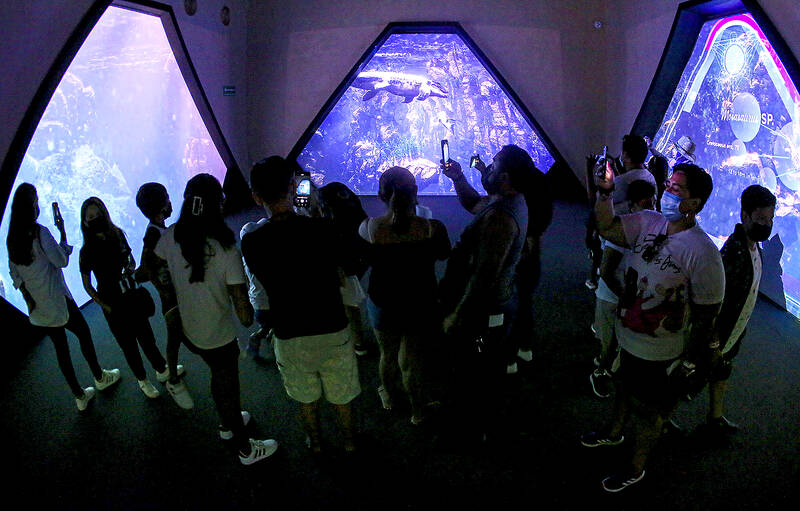Water covers three-quarters of the Earth’s surface and was crucial for the emergence of life, but its origins have remained a subject of active debate among scientists.
Now, a 4.6 billion-year-old rock that crashed on to a driveway in Gloucestershire, UK last year has provided some of the most compelling evidence to date that water arrived on Earth from asteroids in the outer solar system.
The Winchcombe meteorite, one of the “most pristine” available for analysis, offered scientists “a tantalizing glimpse back through time to the original composition of the solar system 4.6 billion years-ago,” said Ashley King, a research fellow at the Natural History Museum in London and author of a new paper on the space rock.

Photo: EPA-EFE
A prevailing theory is that the Earth was barren when it formed, as the inner region of the solar system was too hot for water to condense. The boundary of the region where ice could form in the early solar system is known as the frost line, and is located in the modern asteroid belt. Scientists think that water could have arrived to Earth later, raining down in icy meteoroids and large impacts.
However, there are competing theories, including that water was brought on comets — made mostly of ice and dust — or other similar bodies.
The latest analysis adds weight to the theory that asteroids made a leading contribution to water on Earth. Most of the Winchcombe meteorite was recovered just hours after its spectacular fireball lit up the skies over the UK in February last year during lockdown. One of the largest pieces was discovered on the driveway of the Wilcock family home, and a few smaller pieces were found in nearby gardens.
It is the first-ever carbonaceous chondrite meteorite — the oldest class of meteorites, which contain materials present during the formation of the solar system — to have been found in the UK. Crucially, it was collected within hours of being detected, before any rainfall, and analyzed almost immediately, making it a rare uncontaminated specimen.
The incoming meteorite was also recorded by 16 dedicated meteor cameras, and numerous doorbell and dashcam videos, meaning that scientists could produce an accurate trajectory of where it came from in the solar system. By contrast, most of the 70,000 known meteorites have been found without their impact being recorded — in some cases millions of years after they landed.
“They’re just random rocks that have come to us from space,” King said.
The analysis, published in the journal Science Advances, concludes that the meteorite originated from an asteroid body somewhere near Jupiter. The research also found that the ratio of hydrogen isotopes in the water closely resembled the composition of water on Earth.
“Meteorites like Winchcombe are a pretty good match [to] the water in the Earth’s oceans and suggests asteroids were the main source of water,” said King.
Extracts from the Winchcombe meteorite also contain extraterrestrial amino acids — prebiotic molecules that are fundamental building blocks for the origin of life.
As the composition of the Winchcombe meteorite is so pristinely preserved, the analysis suggests that similar asteroids have played a significant role in delivering the ingredients needed to kickstart oceans and life on early Earth.

Growing up in a rural, religious community in western Canada, Kyle McCarthy loved hockey, but once he came out at 19, he quit, convinced being openly gay and an active player was untenable. So the 32-year-old says he is “very surprised” by the runaway success of Heated Rivalry, a Canadian-made series about the romance between two closeted gay players in a sport that has historically made gay men feel unwelcome. Ben Baby, the 43-year-old commissioner of the Toronto Gay Hockey Association (TGHA), calls the success of the show — which has catapulted its young lead actors to stardom -- “shocking,” and says

Inside an ordinary-looking townhouse on a narrow road in central Kaohsiung, Tsai A-li (蔡阿李) raised her three children alone for 15 years. As far as the children knew, their father was away working in the US. They were kept in the dark for as long as possible by their mother, for the truth was perhaps too sad and unjust for their young minds to bear. The family home of White Terror victim Ko Chi-hua (柯旗化) is now open to the public. Admission is free and it is just a short walk from the Kaohsiung train station. Walk two blocks south along Jhongshan

The 2018 nine-in-one local elections were a wild ride that no one saw coming. Entering that year, the Chinese Nationalist Party (KMT) was demoralized and in disarray — and fearing an existential crisis. By the end of the year, the party was riding high and swept most of the country in a landslide, including toppling the Democratic Progressive Party (DPP) in their Kaohsiung stronghold. Could something like that happen again on the DPP side in this year’s nine-in-one elections? The short answer is not exactly; the conditions were very specific. However, it does illustrate how swiftly every assumption early in an

Snoop Dogg arrived at Intuit Dome hours before tipoff, long before most fans filled the arena and even before some players. Dressed in a gray suit and black turtleneck, a diamond-encrusted Peacock pendant resting on his chest and purple Chuck Taylor sneakers with gold laces nodding to his lifelong Los Angeles Lakers allegiance, Snoop didn’t rush. He didn’t posture. He waited for his moment to shine as an NBA analyst alongside Reggie Miller and Terry Gannon for Peacock’s recent Golden State Warriors at Los Angeles Clippers broadcast during the second half. With an AP reporter trailing him through the arena for an